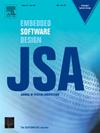一种有效且可验证的保护隐私的安全聚合方案
IF 3.7
2区 计算机科学
Q1 COMPUTER SCIENCE, HARDWARE & ARCHITECTURE
引用次数: 0
摘要
联邦学习因在保持数据隐私的同时支持分布式设备上的协作模型训练而获得了极大的关注。然而,共享梯度会给本地数据隐私带来风险。提出了一种安全聚合方案,解决了联邦学习中的隐私保护和可验证性问题。首先,采用一种新的同态签名算法对聚合结果进行验证。为了高效验证,该算法可分为离线阶段和在线阶段,其中结果在离线阶段预先计算并重用。其次,我们采用对称同态加密轻量级算法生成公钥,大大加快了密钥生成过程,使加密和解密都特别高效。在这种架构下,聚合服务器无法窥探每个梯度的特定内容。任务管理中心无法访问客户端的个人梯度,只能处理聚合信息。这样的设计保证了汇聚服务器和任务管理中心只能在自己的权限范围内访问信息,有效的防止了信息的泄露。最后,安全性评估表明我们的方法满足保护隐私的联邦学习的基本安全标准。在真实世界数据集上进行的综合实验评估表明,所提出的解决方案在实际应用中表现出令人印象深刻的效率。本文章由计算机程序翻译,如有差异,请以英文原文为准。
An effective and verifiable secure aggregation scheme with privacy-preserving for federated learning
Federated learning has gained significant attention for enabling collaborative model training on distributed devices while maintaining data privacy. However, sharing gradients poses risks to local data privacy. This paper presents a secure aggregation scheme that addresses privacy protection and verifiability in federated learning. Firstly, a new homomorphic signature algorithm has been used to verify the aggregation results. For efficient verification, this algorithm can be divided into an offline phase and an online phase, where results are pre-computed during the offline phase and reused. Secondly, we use the symmetric homomorphic encryption lightweight algorithm to generate public keys, greatly accelerating the key generation process, making both encryption and decryption particularly efficient. Under this architecture, the aggregation server is unable to peek into the specific content of each gradient. The task management center cannot access the client’s individual gradient and can only process the aggregated information. This design ensures that the aggregation server and task management center can only access information within their permissions, effectively preventing information leakage. Finally, the security assessment indicates that our method satisfies the essential security standards for privacy-preserving federated learning. Comprehensive experimental evaluations conducted on real-world datasets reveal that the proposed solution demonstrates impressive efficiency in practical applications.
求助全文
通过发布文献求助,成功后即可免费获取论文全文。
去求助
来源期刊

Journal of Systems Architecture
工程技术-计算机:硬件
CiteScore
8.70
自引率
15.60%
发文量
226
审稿时长
46 days
期刊介绍:
The Journal of Systems Architecture: Embedded Software Design (JSA) is a journal covering all design and architectural aspects related to embedded systems and software. It ranges from the microarchitecture level via the system software level up to the application-specific architecture level. Aspects such as real-time systems, operating systems, FPGA programming, programming languages, communications (limited to analysis and the software stack), mobile systems, parallel and distributed architectures as well as additional subjects in the computer and system architecture area will fall within the scope of this journal. Technology will not be a main focus, but its use and relevance to particular designs will be. Case studies are welcome but must contribute more than just a design for a particular piece of software.
Design automation of such systems including methodologies, techniques and tools for their design as well as novel designs of software components fall within the scope of this journal. Novel applications that use embedded systems are also central in this journal. While hardware is not a part of this journal hardware/software co-design methods that consider interplay between software and hardware components with and emphasis on software are also relevant here.
 求助内容:
求助内容: 应助结果提醒方式:
应助结果提醒方式:


